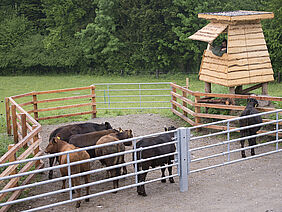The revised Ordinance on Slaughter and Meat Inspection (VSFK) comes into force on 1.7.2020. This regulation will permit the stunning and bleeding of animals on-farm. This decision marks an important milestone in the ten years of preparatory work by the pioneer farms and the organic sector under the leadership of the Research Institute of Organic Agriculture, FiBL. This step was made possible by Lena and Caesar Bürgi, Nils Müller, National Councilor Martina Munz and National Councilor Karl Vogler, the Animal Rights Foundation, the Veterinary Office of the Canton of Zurich, Four Paws (Vier Pfoten) and the Vontobel Foundation. The farming associations, Bio Suisse, Demeter and KAGfreiland, welcome the Federal Council's decision. They are promoting on-farm slaughter on their farms with various measures at the communication and project level.
Promising insights from the pioneers
The first pioneering farms are already using alternative slaughter methods, thanks to cantonal permits. The findings of these farms show that this form of slaughter is particularly animal friendly. The animal is stunned in its familiar environment and then bled. The carcass is then transported in a specially designed trailer. After death, the animal must be driven to an authorised slaughterhouse within 45 minutes of the farm and eviscerated there. Compared to conventional slaughtering, the animals are thus spared live transport and waiting times in the slaughterhouses. This has a positive effect on the stress levels of the animals, and therefore also on meat quality.
In Switzerland, the key pioneers are: Nils Müller and Claudia Wanger, Hof Zur Chalte Hose (Bio Suisse) with the grazing shot as well as Lena and Caesar Bürgi, Hof Silberdistel (Bio Suisse, Demeter) and Georg Blunier, Hof Dusch (Bio Suisse, Demeter, KAGfreiland) and now also Mischa Hofer (Platzhirsch Hofschlachtungen GmbH) with the farm slaughter.
The procedures will continue to require authorisation, which will be issued by the competent cantonal veterinary office. For the time being, these mobile systems will only be used in the cattle sector. In the future, on-farm slaughtering will be extended to other animal species such as small ruminants, pigs and poultry.
Animal husbandry is an important part of Swiss agriculture. The farmer associations, Bio Suisse, Demeter and KAGfreiland, guidelines promote animal welfare and ensure species-appropriate husbandry. FiBL produces a leaflet that gives interested farms an overview of the various farm slaughtering methods and practical tips. More detailed information can already be found on the website Bioaktuell.ch
Further information
Press contacts
- FiBL, Eric Meili, Consulting and project management, 079 236 47 18, eric.meili(at)fibl.org
- Bio Suisse, David Herrmann, Responsible media department, 061 204 66 46, david.herrmann(at)bio-suisse.ch
- Demeter Schweiz, Aline Haldemann, Co-director, 076 418 78 24, a.haldemann(at)demeter.ch
- KAGfreiland, Marco Staub, Head of livestock management, 071 222 18 18, marco.staub(at)kagfreiland.ch
Link
bioaktuell.ch: More detailed information on the subject of farm slaughtering methods (in german)
Download
Press release (in german) (68.5 KB)
Press release (in german) (691.0 KB)
Press release from four paws (Vier Pfoten) (in german) (431.0 KB)




